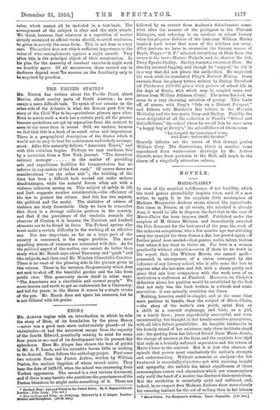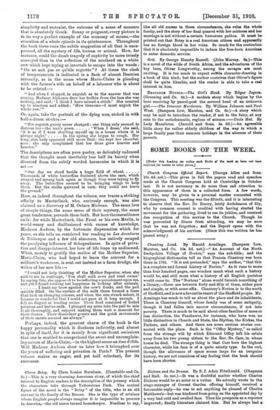NOVELS.
MARIE-CLAIRE.*
IN view of the sceptical indifference, if not hostility, which the word genius proverbially inspires when used of a new writer, to apply it to the exquisite little masterpiece of Madame Marguerite Audoux seems almost like ingratitude. But since in France, at all events, the mischief is already done, it would be idle to disguise the fact that in the case of Marie-Claire the term imposes itself. Published under the auspices of 3f. Octave Mirbeau, and immediately awarded the Prix Goncourt for the best novel of the year, the work of the unknown sempstress, who a few months ago was stitching away her eyesight for three francs a day, has proved again—if further proof were needed—that genius, unlike talent, thrives best where it has least to thrive on. For here is a woman practically without education—even if there be no truth in the report that, like William Morris, she cannot spell— possessed, in consequence, of a vision unwarped by the influence of any literary school, who is able none the less to express what she has seen and felt with a classic purity and grace that can bear comparison with the work even of so meticulous a craftsman as Flaubert. Moreover, on Carlyle's definition alone, her position would be established by the fact that not only was the book written in solitude and semi- starvation : it was actually rewritten ten times.
Nothing, however, could be simpler, and at the same time more perilous to handle, than the subject of Marie-Claire, —the story of the writer's own youth, spent first, as a child, in a convent orphanage, and later, as a girl, on a lonely farm ; years superficially uneventful, and even uninteresting, but fraught, to her keenly sensitive perceptions, with all life's fullest possibilities. As tangible landmarks in the homely round of her existence, only three incidents stand out : the parting from her beloved friend Sceur Marie-Aimee, the change of masters at the farm, and the exquisite love idyll that ends in a brutally enforced separation and the return of Marie-Claire to the convent. But it is just this absence of episode that proves most conclusively the author's strength and understanding. Without comment or analysis—for her treatment is essentially:objective—yet with unerring insight and sympathy, she unfolds the latent significance of those commonplace scenes and characters which are commonplace only until the hand of a master has disclosed their symbolism. But the revelation is essentially quiet and unforced, and, indeed, in no respect does Madame Audoux show more clearly her amazing instinct for the art of writing than in her intense • Maria-Claira. Par Marguerite Audoux. Paris: Pasquells. [3 tr. 50 o.]
simplicity and restraint, the outcome of a sense of measure that is absolutely Greek. Sunny or poignant, every picture is in its way a perfect example of the economy of means,—the evocation of a whole episode in its quintessence. Throughout the book there runs the subtle suggestion of all that is unex- pressed, all the mystery of life, human or animal. How, for instance, could the dumb tragedy of captivity be more tersely conveyed than in the reflection of the neatherd on a white cow which kept trying at intervals to escape into the woods : " On ne sait pas ce qu'elle regrette " ? At times the clash of temperaments is indicated in a flash of almost Ibsenian intensity, as in the scene where Marie-Claire is pleading with the farmer's wife on behalf of a labourer who is about to be evicted :—
" And when I stopped, in anguish as to the answer that was coming, Madame Alphonse drew her bodkin from the lace she was making, and said : 'I think I have missed a stitch.' She counted up to nineteen and added : How tiresome—I must unpick the whole row.' "
Or, again, take the portrait of the dying nun, etched in with half-a-dozen strokes :— " Her roguish gaiety never changed : one thing only seemed to distress her—the nun's gown When I dress,' she said, it is as if I were shutting myself up in a house where it is
always night.' In the spring she began to cough. Her long, slim body appeared still more frail : she kept her cheerful- ness : she only complained that her dress grew heavier and heavier."
The descriptions are often pure poetry, so delicately cadenced that the thought must inevitably lose half its beauty when
divorced from the subtly worded harmonies in which it is set :-
" One day we stood beside a huge field of wheat Thousands of white butterflies fluttered above the ears, which swayed and sprang back again as though they were trying to fly away. The butterflies seemed to be bringing wings to help them. But the stalks quivered in vain: they could not leave the ground."
Here, as indeed throughout the volume, one traces a striking affinity to Maeterlinck, who, curiously enough, was also claimed as a discovery of M. Octave Mirbeau. The same love of simple things, the same sense of their mystery, the same great tenderness, pervade them both. But here theresemblance ends : for while Maeterlinck, like Faust or his own Merlin, is world-weary and disillusioned with excess of knowledge, Madame Audoux, by the fortunate dispensation which for years, as she tells us, restricted her reading to Les Aventures de Taemaque and a few old almanacs, has entirely escaped the paralysing influence of Schopenhauer. In spite of priva- tion and disappointment, her love of life leaps up undimmed. When, merely to gratify the malice of the Mother Superior, Marie-Claire, who had hoped to leave the convent for a milliner's workroom, is sent out instead as a farm drudge, she writes of her new life:— "I could not help thinking of the Mother Superior, when she said to me in contempt, You shall milk cows and tend swine.' In saying this, she appeared to be inflicting a punishment upon me, and yet I found nothing but happiness in looking after animals.
I leant my brow against the cow's flanks, and the pail quickly filled. On the surface of the milk there formed a foam that took on changing colours, and when the sun struck aslant, it became so wonderful that I could not gaze at it long enough. I felt no disgust at tending swine. Their food consisted of boiled potatoes and butter-milk. I plunged my arms into the pail to mix it all thoroughly, and enjoyed making them wait a moment for their dinner. Their discordant grunts and the quick movements of their snouts amused me always."
Perhaps, indeed, the greatest char as of the book is the happy personality which it discloses indirectly, and almost in spite of itself, for it is mainly from significant omissions that one is enabled to comprehend the sweet and uncomplain- ing nature of Marie-Claire,—in the highest sense an dime d'elite. Will Madame Audoux show us later how it triumphed over the years of suffering and privation in Paris P The present volume makes us eager, and yet half reluctant, for its successor.







































 Previous page
Previous page